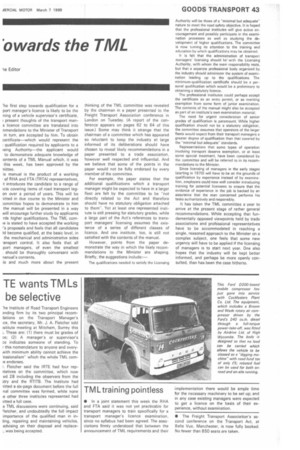'owards the TML
Page 45

If you've noticed an error in this article please click here to report it so we can fix it.
'he first step towards qualification for a port manager's licence is likely to be the fling of a vehicle supervisor's certificate, present thoughts of the transport man s licence committee are translated into emendations to the Minister of Transport in turn, are accepted by him. To obtain certificate—which would represent the qualification required by applicants to a 'sing Authority—the applicant would to demonstrate adequate knowledge of :ontents of a TML Manual which, it was this week, has been approved by the nittee.
is manual is the product of a working of R HA and FTA (TATA) representatives, t introduces the candidate to a range of icts covering items of road transport legon over a period of years. This will be lifted in due course to the Minister and eemmittee hopes to demonstrate to him the manual will be presented in a way will encourage further study by applicants rds higher qualifications. The TML cornie is stated to have accepted the working
proposals and feels that all candidates Id become qualified, at the basic level, in the mechanical and administrative sides .ansport control. It also feels that all port managers, of even the smallest • . should be thoroughly conversant with lanual's contents.
is and much more about the present thinking of the TML committee was revealed by the chairman in a paper presented to the Freight Transport Association conference in London on Tuesday. (A report of the conference appears on pages 62 to 64 of this issue.) Some may think it strange that the chairman of a committee which has appeared so reluctant to keep the industry at large informed of its deliberations should have chosen to reveal likely recommendations in a paper presented to a trade association, however well respected and influential. And we believe that some of the points in the paper would not be fully endorsed by every member of the committee.
For example, the paper states that the additional qualifications which a transport manager might be expected to have in a larger fleet are felt by the committee to be "not directly related to the Act and therefore should have no statutory obligation attached to them". Yet at least one represented institute is still pressing for statutory grades, while a large part of the Act's references to transport managers' licensing assumes the existence of a series of different classes of licence. And one institute, too, is still not satisfied with the contents of the manual.
However, points from the paper demonstrate the way in which the likely recommendations to the Minister are shaping. Briefly, the suggestions include:—
The qualifications needed to satisfy the Licensing
Authority will be those of a "minimal but adequate'' nature to meet the road safety objective. It is hoped that the professional institutes will give active encouragement and possibly participate in the examination processes as well as studying the development of higher qualifications. The committee is now turning its attention to the training and education by which qualifications may be obtained.
It is felt that the administration of transport managers' licensing should lie' with the Licensing Authority, with whom the main responsibility rests, but that a separate professional body organized by the industry should administer the system of examination leading up to the qualifications. The minimum-qualification certificate should be a personal qualification which would be a preliminary to obtaining a statutory licence.
The professional institutes could perhaps accept the certificate as an entry permit, or as meriting exemption from some form of junior examination.
The contents of the manual might also be accepted as part of an institute's own examination material.
The need for urgent consideration of senior grades of qualification is paramount. While higher qualification should not be a statutory obligation, the committee assumes that operators of the larger fleets would expect from their transport managers a greater degree of qualification than that covered by the -minimal but adequatestandards.
Representations that some types of operation involving transport deserve exemption, or at least some special treatment, have been considered by the committee and will be referred to in its recommendations to the Minister.
Since licensing of managers in the early stages (starting in 19701 will have to be on the grounds of qualification by experience instead of by examination, employers could now well consider introducing
training for potential licensees to ensure that the evidence of experience in the job is backed by an assurance that the man concerned performs his tasks authoritatively and responsibly.
It has taken the TML committee a year to arrive at the present stage of rather general recommendations. While accepting that fundamentally opposed viewpoints held by trade associations and professional representatives have to be accommodated in reaching a single, reasoned approach to the Minister on a complex subject, one feels that some new urgency Will have to be applied if the licensing of managers is to start next year. One also hopes that the industry will be kept better informed, and perhaps be more openly consulted, than has been the case hitherto.












































































































































































